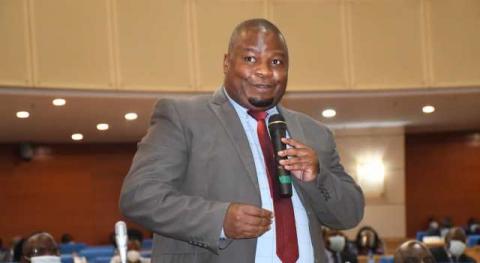SPEECH BY LEADER OF THE OPPOSITION IN PARLIAMENT HONOURABLE DR. KONDWANI NANKHUMWA, MP AT THE END OF 2023/2024 BUDGET MEETING
FRIDAY, 14TH APRIL 2023
LILONGWE
PREAMBLE
Madam Speaker, and Honourable Members,

I stand before you to make my closing remarks at the end of the 2023/2024 Budget Meeting of Parliament.
Allow me to begin by congratulating all the Honourable Members of this august House for fruitful deliberations during the 1st Meeting of the 50th Session of Parliament, which commenced on February 17, 2023, and especially for passing the 3.78 trillion Kwacha National Budget.
This is our time-honoured responsibility, which we should always cherish because we owe it to the people that elected us as their representatives.
Madam Speaker,
This was a Budget Session, and the National Budget has been passed. As the Opposition in this august House, we resolved to support the budget because we believe it remains a lifeline to the country’s social and economic growth. Our Spokespersons on Finance, both in the DPP and UDF, ably responded and presented our respective positions and proposals on the same. We believe our proposals will not fall on deaf ears but that they will be taken on board.
Madam Speaker,
I wish to emphasize the fact that as the Opposition, we will scale up a vigorous tracking process to ensure that the National Budget is fully implemented and that the approved resources do not go down the drain through corruption and blatant wastefulness. We shall make sure that every penny is accounted for.
Madam Speaker,
I am not here for a long speech because I do not think this is the right time for long speeches. We know that this country is going through challenging times as a result of Tropical Cyclone Freddy, which struck Malawi after flooding Madagascar and Mozambique in mid-February.
Over 500 Malawians are now known to have been killed; thousands more have been displaced and rendered destitute. Children have lost their mothers, fathers; relatives and whole families have been swept away and separated.
Madam Speaker,
As I am talking, there are so many makeshift camps across the affected districts in the southern and eastern regions of the country in our collective effort to help the cyclone victims.
Our situation is unprecedented and distressing. Tropical Cyclone Freddy has left us with a monumental challenge, which is wide in scope and reach.
Obviously, the recovery process from this catastrophe will be a long walk from here. But every long walk starts with the first step. This is the time that every available resource must be deployed to ensure the situation does not get out of control.
Madam Speaker,
I would like, in a special way, to register my deep appreciation to the various humanitarian groups and individuals who rendered and are still rendering support to the displaced victims.
Indeed, we are thankful to His Excellency President Lazarus Chakwera, Cabinet Ministers, MPs, and other well-wishers who took their time off their busy schedules to console and condole the affected.
I also wish to convey my deep gratitude to teams and individuals from the private sector, faith community, donor agencies, volunteers, security agencies, health personnel; our neighbouring countries among others for their technical and humanitarian support since the day of the catastrophe up to this day.
Madam Speaker,
Let me also take this opportunity to extend my sincere appreciation to Malawi’s former Heads of State, Excellencies Professor Arthur Peter Mutharika, Dr. Joyce Banda and Dr. Bakili Muluzi for their generosity in providing support to the victims in various ways.
I also wish to thank you, Madam Speaker, for allowing your fellow Honourable Members of this august House to be with their constituents during this most painful moment, and for making your own personal presence to be with the victims.
Madam Speaker,
So many stakeholders, too numerous to mention, continue to join hands in a common effort to lessen the suffering of the affected people. I can single out a few people like Stanley Onjezani Kenani and other Malawians in the Diaspora who have so far done a wonderful job to assist the victims.
What we have witnessed is an overflowing spirit of love and generosity among Malawians to help fellow Malawians at their lowest moment. My fervent prayer is that we must not tire because the gap is too huge to fill. When you lose a loved one, whether wife, husband, daughter, son or uncle, people from all walks of life, including workmates, friends and religious leaders, often come to condole you from the very first day.
They pray. They sing. They offer moral, material and financial support especially before the day of burial. Things are easy in those two or three days when they are around.
However, after burial, these people go and relocate to their homes whether it is in villages, towns or cities. This is when you start experiencing the real pain from the loss. It is when the pangs of widowhood or orphan hood start to bite.
Why am I saying all this, Madam Speaker?
Yes, we visited the victims. We consoled them. We cheered them up but their psychological and poverty warfare started immediately after we left. As I am speaking, these people are homeless. They have no food.
Madam Speaker,
The much-publicized assistance to them is increasingly turning out to be fiction. They are sleeping on empty stomachs and without a blanket or even cloth to cover themselves up. They are vulnerable to communicable diseases such as Cholera. They are now back to square one. Thinking about their departed relations and loved ones, and about the untold misery they have been subjected to as a result of this worst disaster in Malawi’s history. In short, there is untold misery in the camps, which we may not be able to describe.
DOUBLE CATASTROPHE
Madam Speaker,
As much as we did not anticipate this scope of damage from Tropical Cyclone Freddy, we need to accept the fact that it has exposed our vulnerability and lack of preparedness as a nation.
Already, the Integrated Food Security Phase Classification (IPC) analysis released in December last year by the Food and Agriculture Organization, indicated that about 3.8 million people, or about 20 percent of Malawi’s population, will face serious food shortages this year.
This was before the Cyclone. The situation is due to a number of factors, including the mismanagement of the AIP and closure of ADMARC but today I do not want to talk about that.
Madam Speaker,
What this means is that Cyclone Freddy has worsened a situation, which was already worse. We face a double if not triple calamity as a nation. We have to deal with hunger. We have to deal with a fluid Cholera situation, and we also have to deal with the effects of Cyclone Freddy on top of other secondary situations.
Madam Speaker,
I am concerned that up to now, the government has not announced any comprehensive measures to help these people in the short, medium to long term. I know the explanation is that it is too early and that assessments are still taking place. However, there are so many issues that have to be sorted out in the interim as we wait for the completion of a full assessment.
Madam Speaker,
For example, the School Calendar in the Southern and Eastern regions have been disrupted because so many school structures have been turned into disaster camps for cyclone Freddy victims. It, therefore, follows that the housing issue for the victims must be dealt with as a matter of urgency.
There are also disturbing reports of donated items not reaching intended beneficiaries, a situation that is leaving victims in camps to go for days without food, compounding an already worse situation.
It is against this background that I would like to ask the Lazarus Chakwera Administration to immediately roll out a cash transfer programme targeting victims of cyclone Freddy for the next eight months so that they should be able to stand on their own.
A modest 100, 000 Kwacha per family can go a long way to rebuilding their lives. Apart from helping victims to stand on their own two feet, the cash transfer programme would also help take some of the pressure away from the government in the medium term whilst a permanent relocation strategy is being worked out.
CLIMATE CHANGE
Madam Speaker,
Before I conclude, I will not do justice to my remarks if I do not make reference to the elephant in the room.
The issue of Global Warming and Climate Change is not a new phenomenon, nor one that has just emerged recently. In fact, humans have been influencing the climate since the beginning of the Industrial Revolution in the 18th century.
However, it is a fact that our carbon footprint as a country is negligible as compared to the heavy climate polluters in the Northern Hemisphere.
Malawi is one of the countries in the world that are paying a high price owing to the Climate Change phenomenon despite our low carbon emissions. A good example is the situation we are currently going through as a result of Cyclone Freddy.
This brings me to the issue of carbon trading, which is a system that aims to help provide economic incentives to encourage organizations or countries to reduce their environmental footprint. My humble understanding is that countries like Malawi stand to benefit from this system through trading our carbon sinks with financial incentives from the major polluting countries in the Northern Hemisphere.
Madam Speaker,
My question is, how is Malawi situated as far as tapping from this funding is concerned? I am asking this question because I am reliably informed that the process to access this funding is often cumbersome, and full of middlemen whose role is also not clearly defined.
I wish to request the Malawi Government to make its position very clear on carbon trading as a matter of urgency. Malawians need to be assured that their government is making the right decisions on Climate Change and Carbon Trading.
CONCLUSION
Madam Speaker,
In conclusion, I wish to make a special appeal to all Malawians not to lose hope.
Our country is currently going through enormous challenges but there will always be light at the end of this dark tunnel.
The Bible says in Corinthians 4 vs 16 to 18, “For our light affliction, which is but for a moment, is working for us a far more exceeding and eternal weight of glory.”
I am very positive that Malawians, particularly our brothers and steers in the cyclone affected areas, will rise from this catastrophe more resolutely and determined to make Malawi a better place.
Thank You, Madam Speaker and Honourable Members, for your kind attention, and May God Bless Malawi


